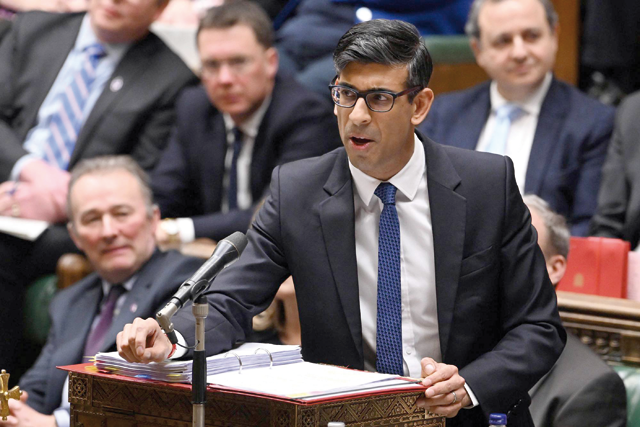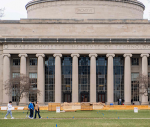You are here
Political and tech leaders tackle AI safety at inaugural summit
By AFP - Nov 03,2023 - Last updated at Nov 03,2023

France’s Minister for Economy, Finance, Industry and Digital Security Bruno Le Maire, German Economy and Climate Minister Robert Habeck, European Commission President Ursula von der Leyen, US Vice President Kamala Harris, Britain’s Prime Minister Rishi Sunak, Italy’s Prime Minister Giorgia Meloni, UN Secretary General Antonio Guterres and Australia’s Deputy Prime Minister and Minister of Defence Richard Marles pose together for the family photo at the UK Artificial Intelligence (AI) Safety Summit at Bletchley Park, in central England, on Thursday (AFP photo)
BLETCHLEY PARK, UNITED KINGDOM — UK Prime Minister Rishi Sunak on Thursday hosted political and tech leaders at the inaugural global AI safety summit, predicting the technology will radically alter society for generations to come.
The release of ChatGPT and other generative AI systems, which are capable of quickly producing text, images and audio from simple commands in everyday language, has captivated the public and offered a glimpse into the technology’s potential.
But they have also prompted concerns around issues ranging from job losses to cyberattacks and the control that humans actually have over the systems.
The two-day summit at Bletchley Park, north of London, kicked off on Wednesday with the publication of an agreement signed by 28 countries and the European Union acknowledging the “need for international action”.
But Thursday is when the leading nations formally got together to address the most pressing risks presented by the rapidly evolving technology.
US Vice President Kamala Harris, Italian Prime Minister Giorgia Meloni, EU chief Ursula von der Leyen and UN Secretary-General Antonio Guterres joined representatives from governments including France, Germany and Australia to discuss global priorities for AI in the next five years.
While China was invited and attended on the first day, it was not invited to more sensitive discussions on the largely behind-closed-doors sessions on the second day.
Sunak was expected to “make the case for global responsibility to address the risks in order to seize the opportunities of AI”, according to his Downing Street office.
He is trying to get other countries to follow the UK’s plans for state-backed testing and evaluation of AI models before they are released.
Harris told delegates of US efforts to help distinguish authentic government-produced digital content from AI-generated content, and to prevent the use of discriminatory AI algorithms, according to her office.
UK Foreign Secretary James Cleverly told AFP there was no time to lose in coordinating a global response to AI.
“We have to move at a pace that matches the pace of technology change, we don’t have a choice,” he said.
“And actually what we’re seeing is a willing[ness] globally, at both government level and within the commercial world, to move very, very quickly.”
Thursday’s second session includes representatives from academia and civil society along with companies at the forefront of AI, such as OpenAI, Anthropic, Google DeepMind and Microsoft.
“I believe there will be nothing more transformative to the futures of our children and grandchildren than technological advances like AI,” said Sunak.
“The UK has led the way in this global conversation on AI safety, but no one country can tackle the risks alone,” he added.
Musk warning
Further AI Safety Summits are scheduled to take place in South Korea and France over the coming year, while the United States and Britain both this week announced the establishment of institutes to examine and evaluate the risks of cutting-edge AI models.
UK Technology Minister Michelle Donelan told AFP on Wednesday that the summit “isn’t designed to produce a blueprint for global legislation”.
But she said it was instead “designed to forge a path ahead... so that we can get a better handle and understanding on the risk of frontier AI” — the first wave of mainstream AI applications.
SpaceX and Tesla CEO Elon Musk attended both days, and described the event as “timely”.
“It’s one of the existential risks that we face and it is potentially the most pressing one if you look at the timescale and rate of advancement — the summit is timely, and I applaud the prime minister for holding it,” he said.
Sunak and Musk were due to hold a joint Q&A session in London after the event closes on Thursday.
Ahead of the meeting, the G7 powers agreed on Monday on a non-binding “code of conduct” for companies developing the most advanced AI systems.
In Rome, ministers from Italy, Germany and France called for an “innovation-friendly approach” to regulating AI in Europe, as they urged more investment to challenge the United States and China.
Related Articles
WASHINGTON — Prime Minister Rishi Sunak opened talks on Thursday with US President Joe Biden at the White House to discuss the Ukraine war a
LONDON — British Prime Minister Rishi Sunak will embark next week on a “diplomatic drive to push UK priorities on the world stage”, attendin
LONDON — UK Prime Minister Rishi Sunak said on Thursday he was open to toughening up his controversial plan to send migrants to Rwanda, whic



















